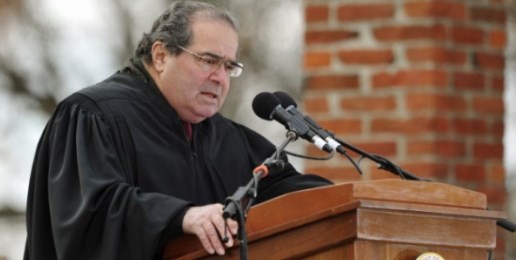
One year after the U.S. Supreme Court’s decision on the Defense of Marriage Act, this much is clear: Justice Antonin Scalia is a prophet.
Back in 2003, when the court handed down the decision in Lawrence v. Texas, striking down all criminal statutes against homosexual acts, Scalia declared that the stage was set for the legalization of same-sex unions. That was 2003.
“Today’s opinion dismantles the structure of constitutional law that has permitted a distinction to be made between heterosexual and homosexual unions, insofar as a formal recognition in marriage is concerned,” wrote Scalia.
He was proved to be absolutely prophetic when, just ten years later, the court ruled in United States v. Windsor that the Defense of Marriage Act was unconstitutional — thus striking down the federal statute defining marriage exclusively as the union of a man and a woman.
Once again, Justice Anthony Kennedy wrote the majority opinion, while Scalia handed down a fiery dissent. As before, Scalia was prophetic.
Even though the Court did not rule that same-sex marriage must be legal in all states, it set the stage for that to happen. As Scalia wrote: “As far as this Court is concerned, no one should be fooled; it is just a matter of listening and waiting for the other shoe.”
One year later, it is abundantly evident that we did not have to wait or listen for long. Almost immediately, challenges to state laws and constitutional amendments prohibiting same-sex marriages erupted.
In a staggering series of decisions at the federal and state levels, judges explicitly cited the nullification of DOMA and the central arguments of the Windsor decision in striking down those laws and constitutional amendments.
A year after the death of DOMA, not one major decision has defended any of these statutes or amendments. Kennedy’s opinion has been cited as authoritative in virtually every one of these judicial actions.
This has meant that in a single year, the legalization of same sex marriage has become a reality or received a positive judicial action in states including Utah, Oklahoma, Kentucky, Virginia, Texas, Pennsylvania, Oregon and a host of other states far from where such unions had previously been recognized.
A year later, it is clear that the Supreme Court remains the central political institution of moral transformation in America.
A year later, it is also clear that the court was riding a vast change in public opinion.
We must also see that the time is almost at hand for that transformation to be made complete, at least in terms of the legalization of same-sex marriage in all 50 states.
What was not clear a year ago was the velocity of this transformation. Even the architects of the revolution are expressing surprise at the speed of these judicial actions.
By the end of this summer, the Supreme Court will likely need to revisit the question once again, this time responding to the cavalcade of lower court decisions the high court spawned.
There is very good reason to expect a decision mandating same-sex marriage coast-to-coast in the Court’s next term, with a decision to be handed down just a year from now, almost to the day.
Furthermore, the Obama administration has been pushing the agenda vigorously, with the federal government now aligning all agency policies in line with the Windsor decision – even extending to areas the decision was never intended to reach.
Where does that leave committed Christians?
Those of us who believe that human flourishing depends upon the recognition and honoring of marriage as exclusively the union of a man and a woman see this transformation of marriage into something radically different as a grave threat to human society and human happiness.
We do not argue that these damaging effects on society and its individuals will be immediately apparent, but we are sadly confident that the subversion of marriage will bring devastating effects over time.
In retrospect, we can also see that previous subversions of marriage set the stage for the radical redefinition of marriage in our times.
Our failure to answer the challenge of rising divorce rates was, eventually, fatal to our effort to defend marriage against its redefinition in terms of gender. Some of us saw this danger at the time, but there was no adequate effort to oppose the devastating impact of divorce.
The larger sexual revolution also plays an incalculable role in this transformation. The moral separation of sex and marriage among millions of Americans removed any hope of establishing a lasting consensus on the central importance of marriage and its essence as a monogamous man-woman union.
A year after the death of DOMA, it is also clear that very real threats to religious liberty now loom before us. This is perhaps the inevitable consequence of a moral revolution of this scale.
Will the government now coerce the consciences of churches, religious institutions, schools, colleges, social service agencies, and the like? There is now strong evidence that government at every level will attempt such coercion. Will America abandon religious liberty for the sake of erotic freedom?
Those of us who believe same-sex marriage to be a moral impossibility now face a very daunting challenge — how to live in a society that is moving so rapidly against our moral worldview, even as the society shared that worldview for over 2,000 years.
We face the challenge of finding how to relate to our neighbors and contribute to the common good when we see that very society undermining human flourishing in the name of sexual liberty.
A year after the death of DOMA the listening and the waiting are almost over. The revolution is almost complete. The shoe is dropping fast.
One thing is clear to all – no one was exaggerating when the Windsor decision was declared by both sides to be revolutionary.
We can all agree on that much, just one year after the revolution was declared.
This article was first published on the CNN Belief Blog.




















